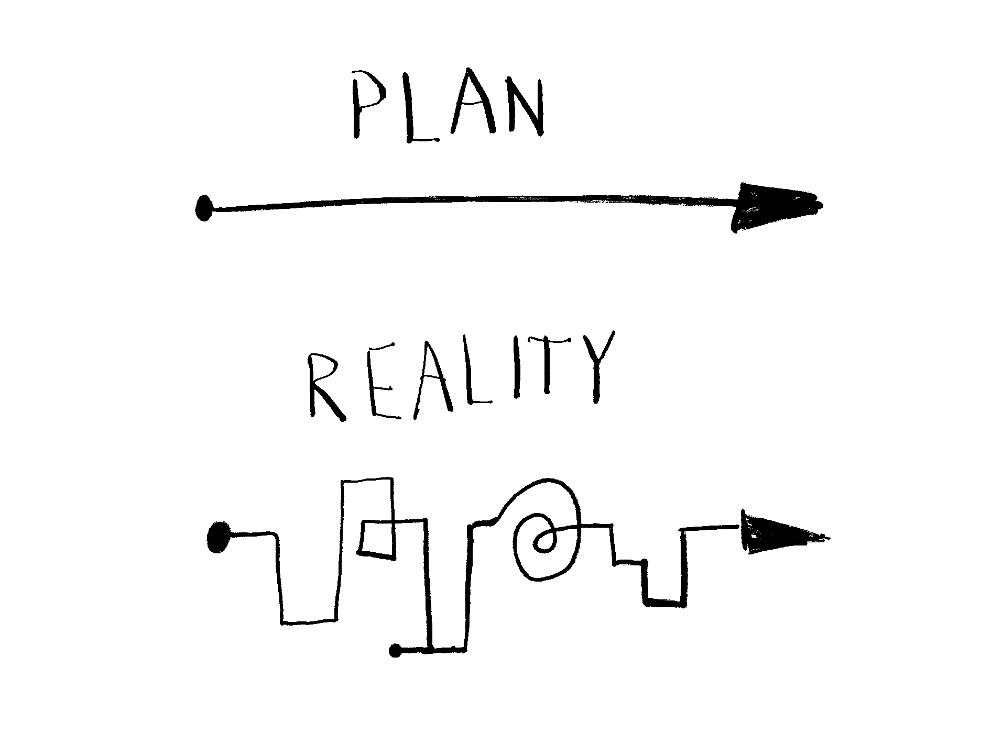Re-Post: Why do things take longer than we expect? The fallacy behind planning
As we get ready to begin another semester, we’re re-posting previous articles from the CPS website that focus on studying and learning techniques. This article, originally published in June 2021, describes how to effectively plan for big projects. We hope these posts can help students prepare for a successful academic year!
By Cade Jakobson
Have you ever said to yourself “oh I will just do that later; I’ll have plenty of time to finish it?” Have you ever tried to plan your whole day out in advance only to have it slowly get derailed as the day goes on? I know for a fact that I cannot be the only one that remembers being in high school or in college and thinking that I have all the time in the world while a due date for a paper slowly looms. If one or more of these things has happened to you don’t worry about it, this kind of thing happens to everyone. The problem is with your planning. Your poor planning misses the mark so much it is considered a mistake or fallacy.
What is the Planning Fallacy?
Griffin and Buehler (1994) define it simply as underestimating how much time things are actually going to take or overestimating your ability to do said things. The effects of the planning fallacy can derail how effective and efficient you are at school or work. Trust me even if you know about it, it can still be an unforgiving phenomenon. There is a rule called the Hofstadter Law that says, “It always takes longer than you expect, even when you take into account Hofstadter's Law.” This basically means that everything is going to take longer than it first appears. For example, if you think a task is going to take you 10 minutes to complete, it is more than likely going to be like 20-30 minutes.
Why the planning fallacy exists
The planning fallacy originates from how our brains interpret information, especially in regard to singular information or information that relates to a solitary task. Singular information tells us about how things in our lives are different and unique from one another. To really understand why we have problems predicting time related events we also need to consider distributional information. Distributional information builds upon and helps us take information and make predictions based on averages that we see. When we are able to contextualize these two forms of information together, it helps us predict how long things will take. Another reason we fall victim to the planning fallacy is because we are very optimistic and confident in our abilities. We think that our future selves are better and faster at doing things than they actually are. This overconfidence and optimism lead us to underestimate tasks because we think we know how long something is going to take. After all we have done it so many times before, why it should be different this time?
Hopefully now you know what to expect from the planning fallacy and how it affects your everyday life, it is important to know there are some different ways you can try to avoid this fallacy in the future. Each tip is really important individually, but if you implement them all simultaneously you are on your way to getting things done while making good time!
One way to avoid future planning errors is to use your past experiences to your advantage. Try to imagine how long something has taken you to do before and base your new time off of that. The second thing that you should try is to set realistic deadlines. Say you have a work deadline or paper due at 11:00 pm. Set a deadline for 9:45 and leave yourself some room in case things go wrong. You could even give yourself rewards or punishments if you meet your own deadlines. This could be in the form of removing distractions like your phone or taking small breaks when you reach a milestone in your work. You should also keep both Hofstadter’s law (thinks usually take longer than you plan) and Murphey’s law (mistakes and errors are common) in mind. Things can and will go wrong so plan for them ahead of time. As long as you give yourself extra time and try to avoid procrastinating, everything should work out just fine.
Summary
The planning fallacy is a shared human experience, but as long as you remember to always give yourself extra time or take a few thigs off your “to-do” list for the day, it does not stand a chance against your wiser ways! Next time a situation arises that has to do with time management, take a step back and analyze the situation. Think about your past experiences and how you can be more efficient this time around. Overall, just make sure to plan ahead. You know what they say, “A bad plan is better than no plan at all”.
References
Buehler, R., Griffin, D., & Ross, M. (1994). Exploring the "planning fallacy": Why people underestimate their task completion times. Journal of Personality and Social Psychology, 67 (3), 366–381. https://doi.org/10.1037/0022-3514.67.3.366
Collingwood, J. (2016). Hofstadter's Law and Realistic Planning. Psychcentral. https://psychcentral.com/lib/hofstadters-law-and-realistic-planning#1
Rampton, J. (May 12th, 2020). What Is the Planning Fallacy, and How Can You Avoid It? Entrepreneur. https://www.entrepreneur.com/article/350045
Gazvoda, M. (Dec 31st, 2017). Man Plans, God Laughs: The Planning Fallacy. htttps://mihagazvoda.com/posts/2020-03-26-man-plans-god-laughs-the-planning-fallacy/
